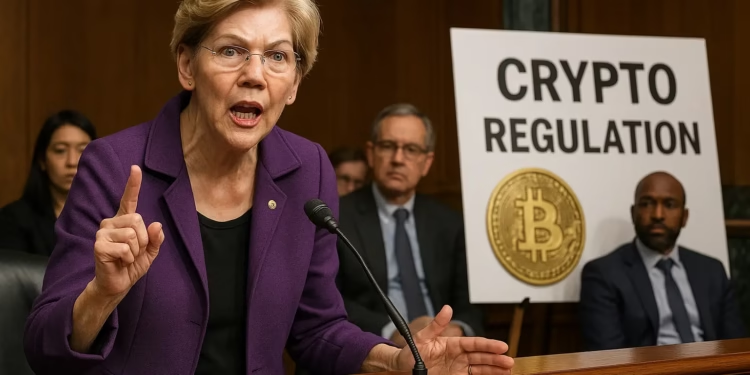A lawyer for U.S. Senator Elizabeth Warren has rejected CZ defamation threat claims from Binance founder Changpeng “CZ” Zhao, insisting that her comments about his criminal case were truthful and consistent with court documents.
The dispute began after Warren posted on X on October 23, criticizing former President Donald Trump’s decision to pardon Zhao. She described the move as an act of “corruption,” linking it to Zhao’s guilty plea in an anti-money laundering case.
Zhao’s legal team swiftly responded, issuing a CZ defamation threat and demanding a public retraction. His attorney, Teresa Goody Guillén, accused Warren of making “defamatory statements that impugn his reputation” and warned of legal consequences if the post was not withdrawn.
However, Warren’s attorney, Ben Stafford, dismissed the allegations in a written response obtained by Punchbowl News. “Any threatened defamation claim would be without merit,” Stafford said, asserting that Zhao “pled guilty to violating an anti-money laundering law.”
The conflict underscores growing political and legal tensions around the crypto industry’s top figures — and highlights how Zhao’s criminal case continues to shape narratives about regulatory integrity in digital finance.
Defending accuracy: Warren’s post aligns with public record
At the center of the CZ defamation threat is Warren’s post stating that Zhao “pleaded guilty to a criminal money laundering charge and was sentenced to prison.” Zhao disputed that characterization, arguing there were “no money laundering charges.”
In reality, Zhao pleaded guilty in November 2023 to failing to maintain an effective Anti-Money Laundering (AML) program at Binance, a violation of the U.S. Bank Secrecy Act. He was sentenced to four months in prison in April 2024.
Stafford defended Warren’s statement, saying it was “true in all respects” and reflected the facts of Zhao’s conviction. He also emphasized that as a public figure, Zhao faces a high bar for any defamation claim, which would require proof that Warren acted with “actual malice.”
“The post simply references the fact that Mr. Zhao pled guilty to a violation of U.S. anti-money laundering law,” Stafford wrote, adding that Warren’s language did not imply Zhao was convicted of money laundering itself.
This legal response directly rebuffs the CZ defamation threat, framing Warren’s remarks as a fair and accurate reflection of the court’s findings rather than a personal attack.
Binance’s U.S. return amid renewed controversy
As the CZ defamation threat unfolds, Binance is reportedly exploring a U.S. comeback following Trump’s pardon of Zhao. According to Bloomberg, the exchange is considering options such as merging its American affiliate with the global platform or allowing its main exchange to directly serve U.S. customers.
Zhao’s pardon has reignited scrutiny of his business dealings, particularly Binance’s reported $2 billion partnership with Trump’s family-backed crypto firm, World Liberty Financial. Warren previously alleged that Zhao “financed President Trump’s stablecoin and lobbied for a pardon,” citing reports from The Wall Street Journal and Bloomberg.
The clemency effectively lifts restrictions that had barred Zhao from participating in Binance operations. With an estimated net worth of $61.4 billion, Zhao remains one of the most influential figures in the crypto industry, controlling over $8.7 billion in on-chain assets.
However, the CZ defamation threat and surrounding controversy could complicate Binance’s reentry into the U.S. market, especially as lawmakers like Warren intensify scrutiny over crypto regulation and political influence.
Legal and political implications for crypto regulation
The CZ defamation threat reflects a broader clash between crypto leaders and U.S. policymakers over accountability, transparency, and the influence of digital asset firms in Washington.
Warren’s push for stricter oversight has long placed her at odds with crypto executives, and her comments about Zhao’s guilty plea fit within her broader campaign against what she describes as “financial misconduct in the crypto sector.”
Meanwhile, Zhao’s legal team maintains that the senator’s remarks misrepresent the facts and harm his reputation. “He will not remain silent while a United States Senator misuses her office to publish defamatory statements,” Guillén said.
Despite these objections, Warren’s attorney has shown no signs of backing down. His written response reiterates that the senator’s post was both accurate and constitutionally protected speech — a stance likely to deter any further escalation of the CZ defamation threat.











